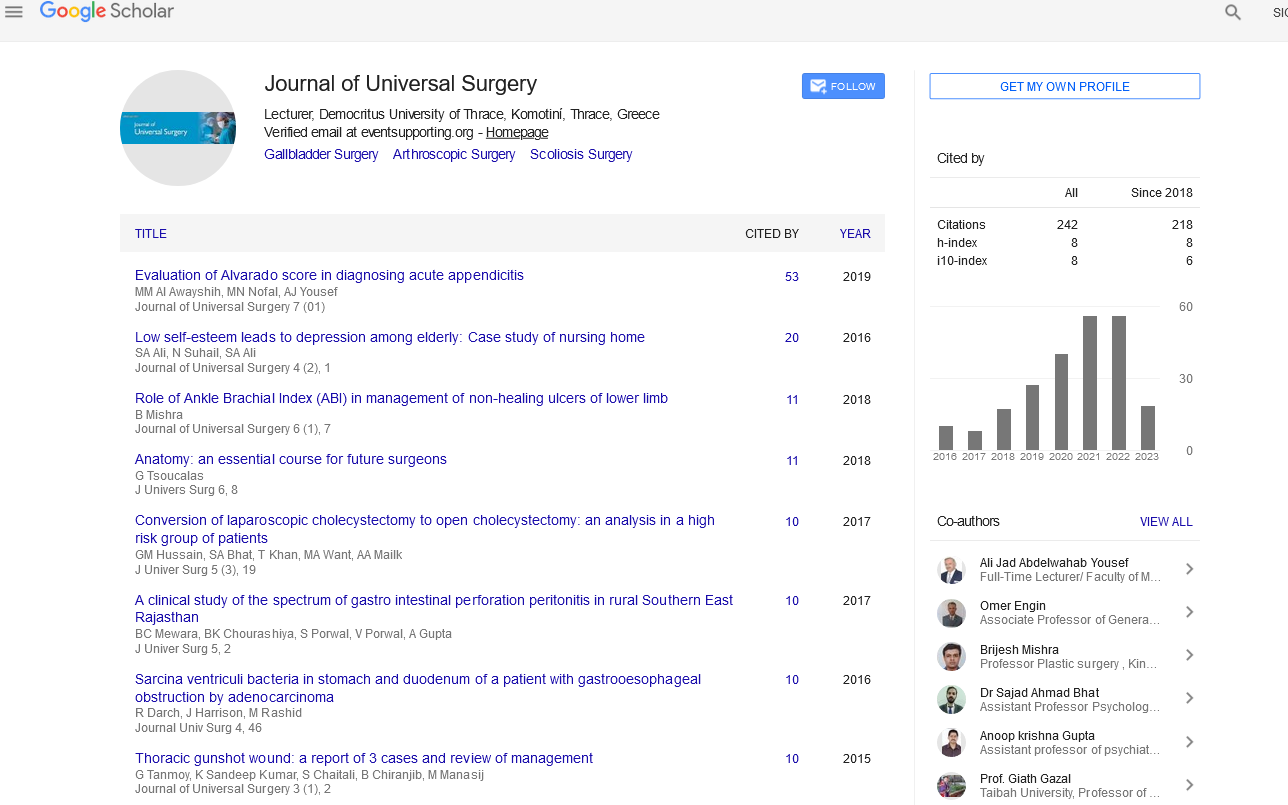Perspective - (2023) Volume 11, Issue 5
Exploring the world of implant surgery: A comprehensive guide
Marcus Sebastian*
Department of Cardiac Surgery, University of Gorlitz, Saxony, Germany
*Correspondence:
Marcus Sebastian, Department of Cardiac Surgery, University of Gorlitz, Saxony,
Germany,
Email:
Received: 04-Sep-2023, Manuscript No. ipjus-23-14203;
Editor assigned: 07-Sep-2023, Pre QC No. P-14203;
Reviewed: 21-Sep-2023, QC No. Q-14203;
Revised: 03-Oct-2023, Manuscript No. R-14203;
Published:
19-Oct-2023
Introduction
Implant surgery has revolutionized the field of medical
science and dentistry in particular. It is a cutting-edge
procedure that involves the insertion of artificial implants
into the human body to replace or support damaged or
missing natural structures. These implants can be found
in various medical applications, from dental implants and
joint replacements to cochlear implants and pacemakers.
In this article, we will delve into the fascinating world of
implant surgery, discussing its evolution, applications,
benefits, risks, and future prospects.
Description
The evolution of implant surgery
The concept of implanting artificial materials in to the
human body dates back thousands of years. In ancient
civilizations, such as the Egyptians and the Mayans,
primitive forms of dental implants were used to replace
missing teeth. These early implants were often made from
materials like seashells and stones, which, while innovative
for their time, had limited success due to their poor
biocompatibility.
The modern era of implant surgery began in the
1950's when a Swedish orthopedic surgeon named Per-
Ingvar Branemark accidentally discovered that titanium
could fuse with bone, a phenomenon known as
osseointegration. This breakthrough led to the
development of the first successful dental implant made of
titanium, which revolutionized the field of dentistry and
paved the way for various other implant applications.
Applications of implant surgery
Dental implants: Dental implants are one of the most
common and widely recognized applications of
implant surgery. These artificial tooth roots are
surgically inserted into the jawbone to support dental
prosthetics like crowns, bridges, or dentures. Dental
implants not only restore the aesthetics of a smile but
also improve functionality and oral health. They offer
a long-lasting and natural-looking solution for
individuals with missing teeth.
Orthopedic implants: Orthopedic implants are used to
replace or repair damaged joints, bones, and connective tissues. These implants come in various forms, such as
hip and knee replacements, spinal implants, and shoulder
replacements. These devices are essential for improving
the quality of life for individuals suffering from arthritis,
fractures, or other musculoskeletal conditions.
Cochlear implants: Cochlear implants are designed to
restore hearing in individuals with severe or profound
hearing loss. These implants consist of an external
component, which captures sound, and an internal
component, which directly stimulates the auditory nerve.
Cochlear implants have transformed the lives of many by
enabling them to hear and communicate more effectively.
Cardiac implants: Cardiac implants include devices like
pacemakers, Implantable Cardioverter-Defibrillators
(ICDs), and Cardiac Resynchronization Therapy (CRT)
devices. These implants are used to regulate and maintain
the heart's rhythm, ensuring the heart functions properly.
Patients with arrhythmias and heart conditions benefit
from these life-saving devices.
Benefits of implant surgery
Implant surgery offers numerous advantages to patients,
making it a popular choice for addressing various medical
issues. Some of the key benefits include:
Longevity: Implants are designed to be durable and longlasting,
reducing the need for frequent replacements or
additional surgeries.
Improved quality of life: Implants can significantly
enhance a patient's quality of life by restoring function and
aesthetics.
Natural look and feel: Dental and cosmetic implants are
designed to closely resemble natural teeth, bones, or body
parts, ensuring a natural appearance and function.
Enhanced self-confidence: For many patients, the
restoration of their appearance or function through implant
surgery can boost self-esteem and confidence.
Minimal maintenance: Unlike dentures or other temporary
solutions, dental and orthopedic implants require little to
no special maintenance.
Risks and considerations
While implant surgery has proven to be highly successful,
it is not without risks. Patients and healthcare professionals
must consider the following factors:
Infection: The risk of infection is present in any surgical
procedure. Proper sterilization and post-operative care are essential to minimize this risk.
Surgical complications: Complications during the surgical
procedure, such as implant misplacement, nerve damage,
or bleeding, can occur but are relatively rare.
Allergic reactions: Some individuals may experience
allergic reactions to implant materials. It is crucial to select
biocompatible materials and thoroughly test for allergies
beforehand.
Cost: Implant surgery can be expensive, and the cost may
not always be covered by insurance, especially in the case of
cosmetic procedures.
Post-operative pain: Patients may experience postoperative
pain and discomfort, which can be managed with
medications and proper care.
Future prospects and innovations
As technology and medical science continue to advance,
implant surgery is set to evolve further, offering even more
possibilities and improvements:
3D printing: 3D printing technology is being used to
create custom implants tailored to a patient's specific
anatomy, increasing precision and reducing surgery time.
Nanotechnology: The use of nanomaterials for implants
is being explored, offering improved biocompatibility and
reduced risk of rejection.
Biodegradable implants: Biodegradable implants are being
developed to replace traditional implants in certain cases,
particularly in orthopedics, reducing the need for a second
surgery to remove them.
Neural implants: Advances in neural implants hold
promise for conditions like paralysis and neurodegenerative
diseases, where implants could help restore lost function.
Conclusion
Implant surgery has come a long way from its ancient
origins to become a cornerstone of modern medicine. It
has transformed the lives of countless individuals, from
those seeking a brighter smile to those in need of lifesaving
devices. With ongoing research and technological
advancements, implant surgery's future is brighter
than ever, holding the potential to further improve the
quality of life for many more people worldwide. As the
field continues to evolve, it is essential for patients and
healthcare professionals to stay informed about the latest
developments and innovations in implant surgery.





